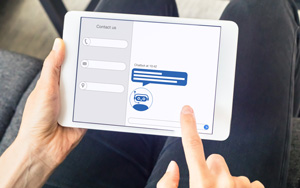 by Kayla Matthews
by Kayla Matthews
Chatbots have become an essential feature for retailers across the world. Businesses benefit from these integrations since chatbots can boost sales, assist customers and help the company stand out. Though chatbots are already making progress in the retail world, AI and COVID-19 are changing things in different ways.
A chatbot is an automatic online program that communicates with users as if it were a human agent. With COVID-19 altering the way businesses operate, chatbots have become more important than ever due to their real-time and ever-present abilities. The past and present strides of chatbots create a stable path for their future, despite the effects of the pandemic.
The Benefits of Chatbots
Chatbots have been growing in popularity for years now. Some began as assistants to provide preliminary information for a human agent. Now, though, they take customer service to new levels for companies of any size.
The availability of chatbots is a standout benefit. All brick-and-mortar stores have hours of operation, and customer service agents aren’t always available to assist callers. The same concept applies to digital stores, too. Though the site always runs, human workers don’t. Chatbots operate at all hours of the day and night, however. If someone has a question or inquiry late at night, they can use a chatbot to get answers.
Due to the constant availability of chatbots, it can help sales increase. A good experience without friction — anything that causes confusion or slows a person down — can turn a visitor into a customer, creating a conversion. Each year, chatbots get more capabilities, the ability to answer questions, track packages, assist with bank information and make purchases. The more abilities, the more customers chatbots can help. Thus, the company’s reach widens and draws in more consumers.
Chatbots also offer customization abilities for each company. Employers can integrate them into their websites and customize things like languages and degrees of assistance.
The Future of Chatbots
Though chatbots have already made significant strides in retail, there’s always room for improvement. New technology can bring these assistance tools to a new level. Artificial intelligence (AI) is a leading force in technology today. Combining it with chatbots is a necessary step for business. Though AI chatbots are already in play, it will push the field forward towards more developments.
AI can learn on the job, which is why it’s so important in the tech world. It gathers information as it operates as if it were human. For customers, it can personalize the chat experience, remembering details and preferences so that they feel the company values them.
The integration of AI is already developing further. For instance, Amelia from IPsoft is a chatbot that operates on AI but has the appearance of a human. More and more chatbots will break ground of what was once unheard of.
Chatbots will evolve beyond AI, too — augmented reality (AR) chat could be an up and coming customer service tactic. Since chatbots are integral to retail, taking the conversational aspect and combining it with new tech is now the path forward.
The Effects of COVID-19
The coronavirus derailed billions of lives around the globe. Stay-at-home orders, social distancing and quarantines have led to impediments for every industry and individual. Retail locations have had to close down and maintain business through ecommerce, if possible. Chatbots are now likely to uphold online retail as societies approach a new normal.
The next steps for business involve standing out in a pandemic-riddled world. Retail employees are going back to work, and companies are reopening little by little. However, many consumers remain wary of a potential second wave of COVID-19. Customers — especially those at high-risk — may continue to shop online to avoid spreading the virus. Here, businesses have an opportunity to stand out.
In the rush of trying to rebuild lost revenue during the peak, all businesses are going to resort to every option they have. Chatbots offer efficiency, personalization, accessibility and cost-effectiveness. As a business integrates chatbots, human agents can focus on other areas of the company that need help after COVID-19.
This focus allows chatbots to secure relationships with new and returning customers while the human employees invest their time elsewhere to bring in profits. Chatbots are then a necessity to stand out in the pandemic era — they allow companies to cover all bases while still providing the best customer service.
Retail Chatbots
Chatbots are a common resource for retailers. After the effects of the pandemic, though, the cost-effectiveness of chatbots is likely to make them more popular. With their benefits and their progressive future, chatbots will help businesses make and save money efficiently while building relationships with the customers.
